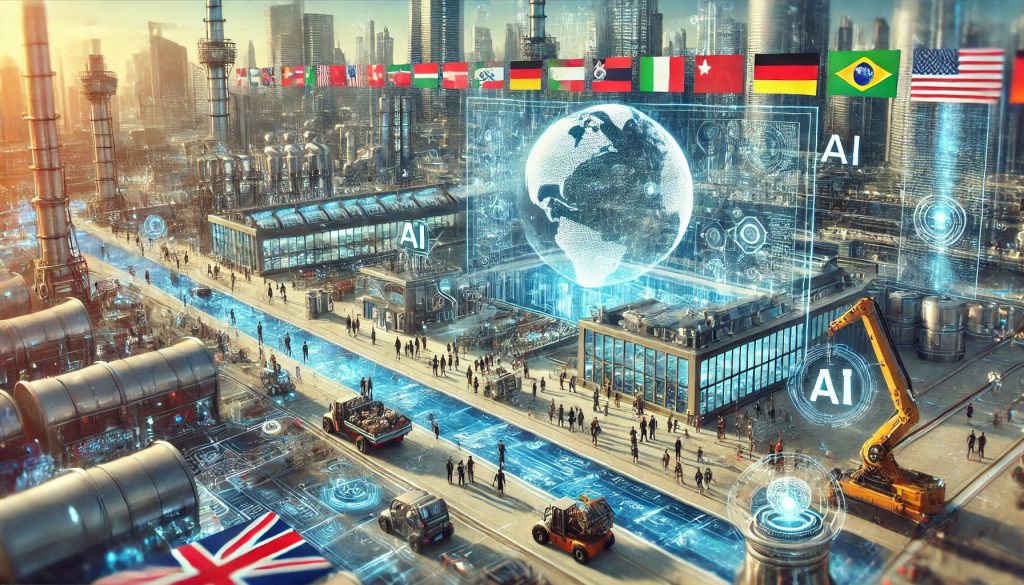In a world increasingly dominated by artificial intelligence (AI) and fierce geopolitical rivalries, nations are in a mad scramble to build their own AI factories. No longer just about having the most powerful military or the largest GDP, the new currency of power is data, and controlling AI infrastructure has become a matter of national security. This race to develop "sovereign AI" may well determine the future winners and losers on the world stage. So, why are countries so eager to build their own AI capabilities, and what does it mean for global tech dominance?
Sovereign AI: A New National Imperative
Let’s face it, no country wants its data in the hands of a foreign government or a tech giant from halfway around the world. Would the U.S. willingly let China manage its AI infrastructure? Would the European Union be comfortable handing over sensitive data to big American tech firms? The answer is a resounding "no." In an era where data is the new oil, countries are moving swiftly to ensure that their AI capabilities remain under their own control, and the race to build AI factories is heating up.
Think of sovereign AI as a country's ability to produce artificial intelligence using its own infrastructure, data, workforce, and business networks. It’s about keeping data local, training AI models that reflect local languages, cultures, and societal values. And let's be honest, it’s also about not letting someone else monetize your country's intelligence, only to sell it back to you at a premium.
Nvidia’s $110 Million Bet on Sovereign AI
Nvidia, one of the biggest players in AI hardware, is placing a huge bet on the rise of sovereign AI. CEO Jensen Huang highlighted the importance of sovereign AI during an earnings call in November 2023, noting that demand for Nvidia’s AI chips was driven by governments looking to build their own AI infrastructure. The U.S. government, for example, has already started restricting sales of Nvidia's most powerful AI chips to China, forcing the Chinese government to invest in homegrown AI chip technology.
So, what does Nvidia do? They earmark $110 million to help countries foster AI startups and build their own sovereign AI infrastructures. Think of it as seeding the future of AI sovereignty while ensuring that Nvidia remains the supplier of choice for AI chips across the globe.
But Is Sovereign AI Really Necessary?
Here’s where the debate gets interesting. Is sovereign AI just a clever sales pitch by Nvidia and other tech giants? Or is it genuinely necessary for countries to build their own AI infrastructure to stay competitive? Some critics argue that AI doesn't care about borders. After all, if data can be securely processed anywhere in the world, why should a country go to the trouble of building its own infrastructure?
But as Huang pointed out, it’s not just about keeping data local; it’s about preserving national identity. "There’s no reason to let somebody else scrape your internet, take your history, your data," Huang said in a 2024 interview with VentureBeat. Countries, he argues, need to use their own data to create AI that reflects their own values and goals. It’s the digital equivalent of building a fence around your backyard to keep the neighbors out.
The Geopolitics of Data
Let’s dive a bit deeper into the geopolitics of this AI arms race. Imagine the consequences if a nation’s AI capabilities were entirely dependent on another country’s infrastructure. It’s not just about the potential for spying or data breaches (although those are very real concerns); it’s also about economic independence and national security.
For example, China isn’t just relying on its domestic market; it's working with Indian companies like Infosys, Reliance, and Tata to build sovereign AI infrastructures. Meanwhile, European countries like France are investing in regional AI clouds through private firms like Scaleway to stay competitive. Even Sweden and Japan have embarked on building their own sovereign AI clouds.
The stakes are high: sovereign AI has become a multi-billion-dollar industry with enormous economic implications. The question is, which countries will emerge as AI superpowers, and which ones will be left in the dust?\

The Economics of AI Factories
One of the most compelling arguments for sovereign AI is its potential to fuel economic growth. According to Nvidia’s CFO Colette Kress, AI infrastructure is becoming a critical part of national economies. It’s not just about protecting data—it’s about driving innovation and creating jobs.
Imagine AI factories as the digital equivalent of the industrial factories that fueled the economic growth of the 20th century. Just as factories turned raw materials into finished products, AI factories transform data into intelligence. And just like traditional factories, AI factories have the potential to create thousands of high-tech jobs in areas like AI model development, data analytics, and cybersecurity.
But here’s the catch: these AI factories consume massive amounts of energy. According to a whitepaper by the Electric Power Research Institute (EPRI), data center power consumption could increase by as much as 166% by 2030. Each ChatGPT query alone can consume 2.9 watt-hours of electricity, about 10 times the energy needed for a traditional Google search.
Nations now have to consider not just the economic benefits of sovereign AI, but also the environmental costs. How will countries balance the need for powerful AI infrastructure with the growing demand for sustainable energy? Nvidia, for one, is working on making its AI chips more power-efficient, but the challenge is far from over.
AI Readiness: Is Your Country Ready?
So, how does a country get ready for the AI revolution? According to Shilpa Kolhatkar, Global Head of AI Nations at Nvidia, it’s all about having the right ecosystem. This means having enough AI compute power, skilled workers, and the infrastructure needed to support large-scale AI projects. And let’s not forget about the "democratization" of AI—ensuring that the benefits of AI extend beyond a select group of data scientists.
When generative AI platforms like ChatGPT exploded onto the scene in 2022, it became clear that AI was no longer a futuristic concept; it was here, and it was working. But this rapid development also highlighted a new challenge: regional differences in how AI models are trained. A model trained on Western languages and datasets may not perform as well in non-Western countries, where local languages and customs are vastly different.
This is why sovereign AI has become such a hot topic. Countries like Japan are already developing AI models that reflect their own cultural and linguistic nuances. The goal is to ensure that AI doesn’t just work—it works in a way that’s relevant to local populations.
AI Factories: The New Critical Infrastructure?
As AI becomes a critical part of national infrastructure, countries are starting to think of AI factories the same way they think about dams, airports, and highways. These aren’t just high-tech data centers; they’re the backbone of a nation’s future economy.
In fact, Nvidia has even gone so far as to build digital twins of AI factories using its Omniverse software. These digital replicas allow engineers to optimize everything from energy consumption to workflow efficiency before a single brick is laid. It’s like SimCity, but for the real world.
But will every country need its own AI factory? Or will smaller nations band together to create regional AI hubs? The Nordic countries, for example, are already collaborating on AI research, and nations like the U.S. and Japan are teaming up to stay ahead in the AI race.
Energy: The Achilles Heel of AI?
One of the biggest challenges facing AI factories is their enormous energy consumption. As noted earlier, AI queries can use up to 10 times the energy of a traditional Google search. And with data centers already consuming around 200 terawatt-hours (TWh) of electricity per year, the energy demands of AI are only going to increase.
In response, companies like Nvidia are working to make their AI chips more energy-efficient, but it’s a race against time. Some experts are already warning that we may need to rethink the entire infrastructure of AI to avoid a future energy crisis.
Do We Really Need Sovereign AI?
At the heart of this debate is a simple question: do we really need sovereign AI? On one hand, the idea of each country building its own AI infrastructure makes sense in terms of security, economic growth, and cultural preservation. On the other hand, some critics argue that AI, by its very nature, transcends borders. Computers don’t care about national boundaries, so why should we?
Kate Edwards, CEO of Geogrify, believes that the term "sovereign AI" could set a dangerous precedent. "Sovereignty implies a power dynamic that often fuels nationalism and populism," she argues. By framing AI in these terms, we risk turning AI into yet another tool of geopolitical conflict, much like nuclear weapons.
So, where does that leave us? Are countries genuinely interested in building sovereign AI to protect their data and culture? Or is this just a clever sales pitch from companies like Nvidia, designed to sell more AI chips?
The Bottom Line
The race to build AI factories and develop sovereign AI is about much more than just technology. It’s about national identity, economic independence, and the future of global power dynamics. Countries that invest in sovereign AI today are positioning themselves to be leaders in the 21st century, while those that fail to adapt may find themselves left behind.
As AI continues to evolve, the debate over sovereign AI will only intensify. Will countries prioritize control over their own data, or will they embrace a more global approach to AI development? And what role will companies like Nvidia, AMD, and Cerebras play in shaping the future of AI?
Join the Debate
What do you think about the rise of sovereign AI? Is it a necessary step for countries to protect their data and culture, or is it just a high-tech sales pitch? Let us know in the comments below, and join the iNthacity community—apply to become permanent residents and citizens of the "Shining City on the Web". Don't forget to like, share, and engage in the debate!
Disclaimer: This article may contain affiliate links. If you click on these links and make a purchase, we may receive a commission at no additional cost to you. Our recommendations and reviews are always independent and objective, aiming to provide you with the best information and resources.
Get Exclusive Stories, Photos, Art & Offers - Subscribe Today!
























Post Comment
You must be logged in to post a comment.